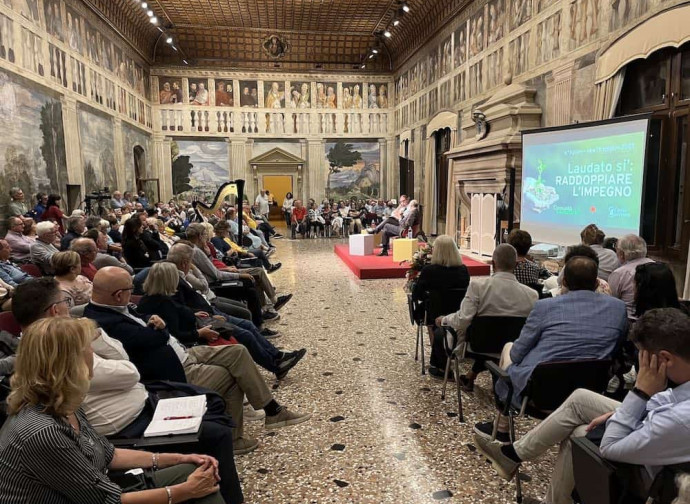Green Church embraces anti-natalist ideology
The surprising forum of the Laudato si' Communities in the episcopal palace of Verona, Italy. Anti-natalism, climatism, and food ecologism to bend Christianity to some of the political and economic demands of today's world.

On Saturday 14 October 2023, on the banks of the River Adige, the sixth forum of the Laudato si' Communities was held in the Bishops' hall of the episcopate of Verona, hosted by Bishop Domenico Pompili and with a video-message from the pope, entitled 'Doubling the Commitment', starting from Francis' Exhortation Laudate Deum. Before 2013, it would have been an unthinkable to propose and conduct a meeting of this sort but even today it is definitely surprising.
Let us begin with the invited speakers. The first was Carlo Petrini, inventor and patron of 'Slow Food'. Petrini is a friend of Bishop Pompili. It was he who had introduced him to Francis. The two had then met several times and this led to the publication of the gastronome-writer's book 'Terra futura' in 2020, with a preface by Pompili himself. On Sunday 15 October, Petrini, together with the bishop of Verona, also summed up the meeting, proposing a manifesto titled “Six ecologically virtuous food habits”, which are as follows: “Eat local, seasonal food, reduce the consumption of animal protein, reduce the consumption of ultra-processed food, reduce food waste, reduce the consumption of single-use plastic, reduce water consumption”. What connection there is between being Catholic and taking on Petrini's ingenious new ecological decalogue is unknown and the doubt arises that, in the end, Laudato sì communities coincide with Slow Food communities.
The second guest was Gaël Giraud, a French Jesuit and economist working in Washington and author, among other things, of the book 'The gentle transition of ecological conversion' published by none other than the Vatican. So there can be no doubt about his ideas on the environmental issue. Also present was Franco Rovelli, a physicist and essayist who extensively praised Francis' recent Exhortation. Here too a perfectly aligned thought. Finally, Carlos Alvarez Pereira, vice-president of the Club of Rome, was present. Of course, Pereira called for the Great Reset: the development model is unsustainable, a change is needed that is simultaneously social, cultural, political, and economic, a new way must be found, one that is compatible with human wellbeing and at the same time with the wellbeing of all that is not human. We can also observe Pereira's harmony with the ideology of the forum and thus note again that all the speakers recited the same script in chorus, but that would be too little, given what the 'Club of Rome', of which Pereira is vice-president, was and is.
As is well known, this Club, founded in 1966 by Aurelio Peccei, published in 1972 the Report Limits to Growth, also known as the Meadows Report, which presumed to predict the (negative) consequences of birth rates on economic development up to 2050. It was the first to foresee 'emergencies', which never actually occurred because they were ideologically produced, proposing a fall in birth rates as their solution. The ideology of the Club of Rome was centred on mankind as the main architect of humanity's alleged future disasters, revived today with the ideology of anthropogenic climate change. The Club of Rome initiative was then part of a convergence of multiple global institutions interested in proposing a substantial neo-Malthusianism. If the other speakers present in Verona arouse perplexity, Pereira's presence is disconcerting. The Church (of that time) had always countered the attack on mankind with environmentalist excuses.
Bishop Pompili emphasised that ecological transition is not enough, ecological conversion is needed, which claims to give a Christian soul to a political choice, and a questionable and debatable one at that. The entire forum was geared towards bending Christianity to certain political and economic needs of today's world, without setting criteria for judgement, without referring to the principles of the Social Doctrine of the Church, without taking into account what the Church had taught on these issues until the day before yesterday. Slavishly copying the Laudate Deum, all the speakers savaged the 'technocratic paradigm', as if the green revolution were not technocratic, but happy, spontaneous, and bucolic, and as if the transitions it requires were not very costly for some and very advantageous for others. That is very costly especially for the poor.
It remains to be explained why it should be a bishop who hosts such an event, why it should be held in an Episcopal hall, why the words Jesus Christ were never uttered, why only single-minded speakers were invited, why the conclusions were placed in the hands of like-minded Petrinis of the day, why the embarrassing decalogue he proposed should be taken as a criterion of life, why people, including the faithful, should not be accustomed to using reason, why the position of globalist power on the environmental crisis should be espoused while pretending to criticise it and why the floor should be given to exponents of decidedly anti-Christian and anti-human cultural and political lines.
Environmentalism and Globalism, the two most dangerous ideologies
Environmentalism is an enormous ideological bubble, globalism is an ethics of humanity with few and generic moral principles for a universal religion without dogmas and doctrines. This alarming project is also being supported by the Catholic Church. The XII Report of the Cardinal Van Thuân Observatory is dedicated to ‘Environmentalism and Globalism’, the two most dangerous ideologies of the moment, which aim to converge on one single world political programme.
